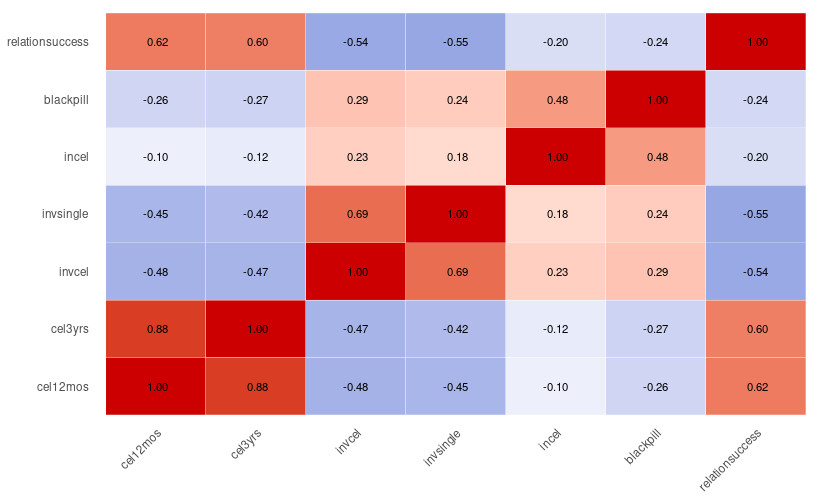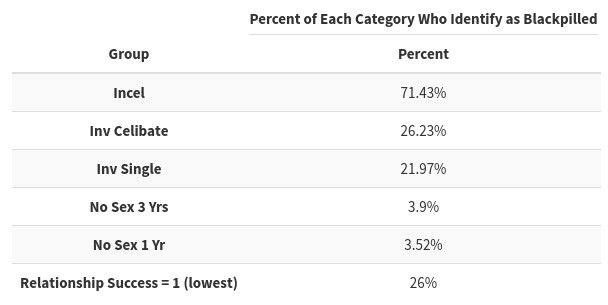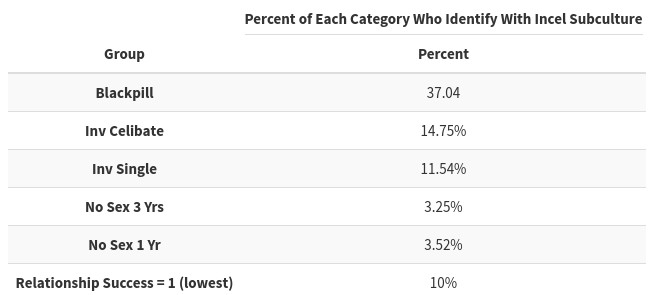Enjoy DatePsychology? Consider subscribing at Patreon to support the project.
Correlation does not equal causation, but when a variable X is causal of a change in variable Y you should see a correlation. When X explains most of the variance in Y, the correlation is large.
A popular explanation for incel phenomena is that being single is what produces incels. In other words, low relationship success and singledom is causal of inceldom. This is a reasonable hypothesis. As the name incel indicates, these are men who have formed a community around the identity of being celibate involuntarily.
However, being single or celibate involuntarily is not the same as adopting incel ideology, or participating within incel subcultures.
Further, what it means to be an “incel” depends entirely on how you measure it.
Methods
I used the dataset from my RMET survey and first selected only men. This left me with a sample size of 255.
To measure inceldom, I asked:
- Do you identify with the incel subculture.
- Do you identify with the blackpill.
- Are you involuntarily celibate.
- Are you involuntarily single.
- Have you had sex within the past 3 years.
- Have you had sex within the past 1 year.
- On a scale of 1-7, what is your relationship success (1 being the lowest).
Here we have measures that operationalize what it means to be an incel in different ways. An incel could be a man who says he is an incel. It could be a man who is, literally, involuntarily celibate. An incel could also be a man who hasn’t had sex recently, or who has extremely low relationship success. It could also be a man who is blackpilled, or who shares many ideological beliefs with incels.
Hypothesis
If being excluded from the sexual marketplace is mostly what causes inceldom as measured by self-identification, we should see that low relationship success, not having had sex recently, and being involuntarily celibate/single have large correlations with incel identification and blackpill identification.
Results
Here are the percentages and counts of men who reported low relationship success. A 1-3 on a scale of 7:

A little less than half the sample viewed their own relationship success negatively to some extent. 44.3% in total.
Next are the percentages and counts of men who reported being involuntarily celibate or involuntarily single:

Here are the percentages and counts of men who reported as celibate within the past year or the past three years:

Note that the values for the last two tables aren’t independent; men who haven’t had sex in the last 3 years also haven’t had sex in the last 12 months. Men who identify as involuntarily celibate may also identify as involuntarily single. Further, this is not a representative sample, so you can’t conclude anything about sexlessness in the general population from this. Although, at 39% it’s probably pretty close to sexlessness in the male population between age 18-25 based on the most recent GSS data.
Here are the percentages and counts of men who reported as identifying with the incel or blackpill subculture:

These are also not independent; some incels identify as blackpill.
You can already see a trend here going from the top descriptive table to the bottom. Not all men with low relationship success are sexless. Not all sexless men are involuntarily celibate. And not all involuntarily celibates identify as incels or blackpillers.
How close are the relationships between these variables?

Cel3yrs and cel3mos are reverse coded, so those should be negative correlations. For example, the correlation between having high relationship success and being celibate for 3 years is -.88 and not .88. People who haven’t had sex in 3 years report low relationship success.
On the other hand, relationship success predicts incel identification less well, at -.20. You could have already guessed something like this from the descriptive statistics. Many men have low relationship success, but relatively few become incels. Most men who reported as involuntarily celibate also didn’t identify with incels. Most men who haven’t had sex within the last 3 years didn’t identify as incels, either.
Not even all participants who did identify with incels identified with the blackpill.
The blackpill is not synonymous with inceldom, but it describes the set of beliefs held by incels. Inceldom might be a status, but blackpill is an ideology.
Here are the percentages of men in each category who identified as blackpillers:

And here are the percentages of men in each each group who identified as incels:

Conclusion
It is fair to say that being involuntarily celibate is a necessary prerequisite for being an incel. The term “fakecel” is used in incel communities to describe community members who are suspected of secretly being attractive to women. They are juxtaposed with the so-called “truecel.” Incel forums have rules and will remove men who are suddenly able to get a date, have sex, or who they even think might have gotten a little too much female attention. They enforce the inceldom rule.
At the same time, this does not mean that sexlessness produces incels. As we have seen, most men who are not having sex, nor having success with relationships, do not become incels. At least not insofar as incel is operationalized by incel subculture participation or belief in blackpill ideology.
This raises a question: why do some sexless men participate in incel communities, or embrace blackpill ideology, while others do not? Not having sex doesn’t explain it; both are not having sex. Here are where individual differences in personality, belief, and behavior come into the picture. The questions here aren’t designed to answer what those traits are. All we know is that not having sex doesn’t seem to explain a lot of the variance in who becomes an active participant in incel communities.
3 comments
Has anyone actually checked whether self-identified big-I Incels who engage in misogynistic incel forms are in fact largely and significantly uglier than average?
(by “uglier” I mean both facial and body attractiveness, including height)
Is there an acronym for me too? here goes: I was voluntarily celibate and voluntarily single ONLY FOR ONE YEAR BUT ITS LASTED LONGER Now I am Involuntarily single, a Woman and my ideology requires mandatory celibacy. Not voluntary not involuntary…MANDATORY!
I came up with
InVoLUntarily single WomAn; IDeOlogy requires MANdatory celibacy: VULWA or I DO MAN! I can’t decide